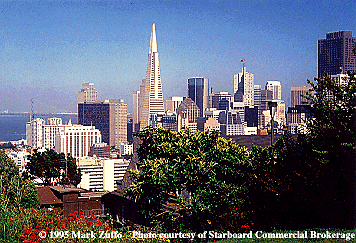|
The mad party in Silicon Valley may have ended - some profoundly wacky things were being funded and that has ceased - but the band is still playing. If you want to find out the mood and morale of the US economy Buck's Cafe in Silicon Valley is as good a barometer as anywhere. Just up the road at one of the leading local residential realtors, Alain Pinel, the story is the same. Roseann Miller says that having waited "with bated breath" to see what the change in the economy means, "the business is as robust as it was this time last year. A house in Palo Alto that was $600,000 (£400,000) four years ago is $1.2m now." But while the young bucks may still be enjoying themselves at Buck's and the property market has not fallen through even the first floor, other indicators are already pointing towards the end of what had seemed like an endless economic summer. From their peak in the glory days of March to the end of last year, the hi-tech companies listed on the Nasdaq stock market index fell 54%. This unprecedented plunge in paper wealth represents a loss of $3.3 trillion, equivalent in US dollar terms to about a third of America's housing. And its not just the .coms, things are not looking good for the .(tele)coms There isn't a Telco in the world that isn't in retreat, looking to cut costs and reel in debtors to try and maintain profit and share value. And one one of the biggest debtors are ISPs - the more it changes the more it stays the same, the domino affect just won't retire. All those who trumpeted free this and free that via the Internet (mainly headline grabbing magazines, notably the IDG group) may have to suck the trumpet. The bursting of the bubble has hit all hi-tech companies, from the newest loss-making start-up to the world's biggest and most profitable groups. A total of $390bn has been wiped from the stock market value of Microsoft alone, the software group and Bill Gates, the company's founder, lost more in one year - an estimated $40bn - than twice the gross domestic product of Luxembourg. Jeff Bezos, founder of Amazon.com, was named Time's Man of the Year in 1999, but last year he lost seven-eighths of his paper wealth. That is just two signs of the downturn in the fortunes of Silicon Valley and with it the global e-conomy. Webmergers, an internet consultancy, says 210 dot.coms went out of business last year. More than half collapsed in the last three months of the year. Most Wall Street analysts expect this trend to accelerate at the start of 2001 as funding dries up. More than 41,000 dot.com jobs were cut as a result of cost-cutting or collapse last year, according to the international outplacement firm Challenger Gray & Christmas. Worst hit were companies that claimed to revolutionise the way we buy and sell goods. Santa Monica-based eToys, one of the last pure internet retailers, is the latest to hit trouble. Last week, the company announced 700 job cuts, about 70% of its work force, after closing down its UK operations. In New Zealand the e-tailer Flying Pig and the ISP/e-verything IHUG both cut deep into their staffing levels in 2000. Valley wits now say that the acronym for such websites as B2C (for Business to Consumer) really meant Back to College, reflecting the fact that many of the twenty-somethings who scorned more traditional careers for a chance to become dot.com billionaires are now rethinking their options. Last year, more Harvard Business School graduates went into hi-tech jobs than any other profession. This summer, consultancy and investment banking are expected to be popular once more. With the collapse of even the largest companies, recruitment sites have been replaced by websites with names such as dotcomfailures.com and startupfailures.com. So do the notices outside Robert's, the Woodside grocery and liquor store, give a hint that the chill winds are blowing in? A 1916 Steinway is for sale for $17,000. Sacrifices are clearly having to be made. Just to the south in Palo Alto, there may be a sale on at the Sports Memorabilia store so that Michael Jordan's autographed shirt is now only $2,559 and there may be the odd bum asleep on the corner of University and Bryant, but the mood remains bullish. "There is no recession at all in California, although there is a fear of one in the nation," says Steve Levy, director of the Centre for the Continuing Study of the California Economy in Palo Alto. "California is going to have a slowdown but there is a great difference between a slowdown and a recession." Eric Savitz, executive editor of the Industry Standard, the San Francisco-based magazine of the internet economy that is famous for its Friday night parties, shares his view. "For six months or more we have been experiencing the deflation of the dot.com bubble and clearly the economy is slowing down. It's going to be a bit of a difficult period for technology companies and there is going to be a more rational approach to valuing new companies. I think that's healthy. People are more cautious now. There is a new sobriety. It was a really good party while it lasted but now it's time to get to work." Classic US approach, think positive, which may work for the select few in Silicon Valley. The rest of the world never really made it to the party anyway and would be advised to further distance themselves from it if they want to avoid the job of cleaning up the morning-after..
|

